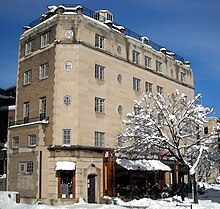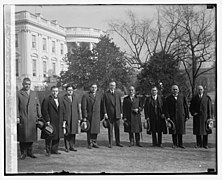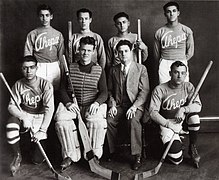AHEPA
| American Hellenic Educational Progressive Association (AHEPA) |
|
|---|---|

|
|
| founding | July 26, 1922 |
| Seat | Washington, DC |
| main emphasis | Cultural promotion |
| Chair | George G. Horiates (Supreme President), Jimmy Kokotas (Supreme Vice President) |
| Website | www.ahepa.org |
The AHEPA (acronym for: American Hellenic Educational Progressive Association ) is an organization that was once committed to promoting social exchange between Greeks and non-Greeks (as well as assimilation and integration) and is now active in promoting culture. Members are often people of the Greek diaspora or Philhellenes , including three presidents of the USA so far.
history

Anti-Greek riots broke out in North America at the beginning of the 20th century, of which the riots in Toronto in 1918 were a culmination. As a result, the Ku Klux Klan began to intensify its attacks on Greeks and their businesses in the southern United States. Since this also had an influence on local courts, victims could not appeal or only obtain their rights in higher instances, provided that the cases were processed at all. Citizens of Greek origin founded the Order of AHEPA on July 26, 1922 with the aim of helping the victims on the one hand and promoting assimilation on the other, for example with English courses. It was believed that only good American citizens would give the Greeks adequate protection, and so the AHEPA worked closely with other organizations, including the B'nai B'rith and the NAACP . During World War II , it sold $ 500 million in US Treasuries, more than any other organization.
In 1978, "The Moorings", the headquarters of AHEPA, was listed as a "Historic Place". The Art Deco building was designed by Horace W. Peaslee in 1927 and sold to the AHEPA a few years later; it is part of the Dupont Circle Historic District .
In 2003 Canada Post issued a stamp for the 70th birthday of the local branch of the AHEPA, even though it only has 1500 members.
Social engagement
With the end of immigration from Greece and the completion of assimilation, the field of activity shifted more and more to the cultural area, mostly with reference to Greek culture, such as the financing of research projects in classical archeology and Byzantine studies.
The fields of activity are very diverse, in the USA they also include sporting events, or charity events or a donation for the renovation of the Statue of Liberty. In Greece u. a. In Athens, the AHEPA wing of the Evangelismos Hospital was inaugurated in 1950 and the Truman Monument was donated in 1963; in Thessaloniki it maintains the AHEPA University Hospital .
presence
Initially it was a lodge association in the southern states and only reserved for people of Greek origin, later the AHEPA expanded in the second half of the 20th century to an open USA-wide organization (with additional offices in Greece and Cyprus). It was divided into "Subordinate Lodges" and "Superior Lodges", which were replaced by "Chapter" and "Districts". From the founding period, the term "Supreme" can be found in positions such as Supreme President or Supreme Treasurer.
In 1979 the AHEPA had over 25,000 members, in 1989 it was over 60,000. The promotion of culture led to the establishment of branches, including in Australia (AHEPA Australasia, since 1982) and Canada. There are over 600 chapters worldwide, but 540 of them are in the United States. It is estimated that over 250,000 people have been members of the AHEPA in their lifetime over the past 90 years.
Presence in German-speaking countries
The AHEPA has only been present since 2018, currently (as of 04/2020) with the following branches:
- Chapter 604 " Nikos Kazantzakis ", Berlin
- Chapter 608 " Friedrich Schiller ", Stuttgart
- Chapter 661 " Lucas M. Miller ", Wiesbaden
- Chapter 617 " Johann Wolfgang Goethe ", Frankfurt
- Chapter 618 " Friedrich von Thiersch ", Munich
- AHEPA Vienna " Nikolaus Dumba "
gallery
AHEPA Memorial in Riverside Park in New Smyrna Beach , Florida
Web links
Individual evidence
- ↑ https://www.pappaspost.com/on-this-day-february-3-1929-first-ever-greek-community-meeting-with-us-president/
- ↑ https://postagestampguide.com/stamps/17449/american-hellenic-educational-progressive-association-ahepa-canada-1928-2003-2003-canada-postage-stamp
- ↑ Düsseldorf work on the history of medicine: The history of the Evangelismos hospital, 1974, p. 45
- ^ Alan Axelrod, International Encyclopedia of Secret Societies and Fraternal Orders , New York: Facts on File, 1997, pp. 4-5
- ↑ AHEPA membership fact sheet via AHEPA HQ in Washington, DC
- ↑ http://ahepahellas.org/ahepa-european-chapters/







